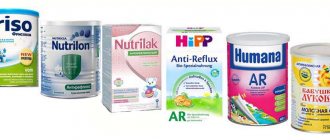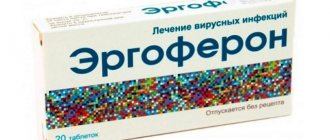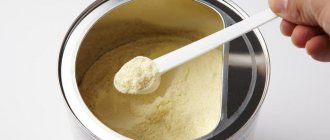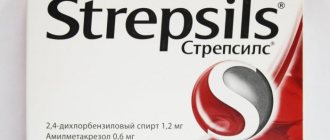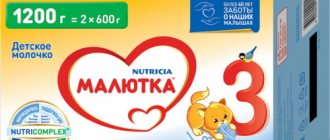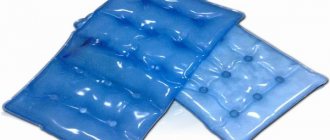For full growth and development, a child, especially a newborn, needs a balanced diet. As is known. The best food for a baby is only mother's breast milk. But, if the mother has no milk or very little of it, the question arises of choosing the optimal formula for artificial feeding.
The composition of the mixture directly affects both physical and mental development, models the composition of the intestinal microbiota and contributes to the development of the baby’s immune system.
It is important to choose a high-quality breast milk substitute that contains a full range of vitamins, minerals, beneficial elements and is close in composition to natural breast milk. That is why every young mother should strive to prolong natural feeding as much as possible.
There are often situations when a forced transition to artificial feeding occurs, so selecting a formula is a very responsible and important stage.
The selected product should closely match the composition and properties of breast milk.
Today on sale you can find a huge selection of mixtures from a variety of manufacturers, among which the most popular is the mixture.
The main criterion when choosing a formula is how the baby reacts to this product.
Choosing infant formula by age and health status
Artificial products can be divided into age-specific mixtures corresponding to the baby’s age:
- An infant up to six months old needs to buy nutritional formulas that contain a concentrated complex of essential proteins, fats, minerals and vitamins, as well as amino acids. Moreover, the calorie content of the product should be at least 65-73 units. At the same time, the composition should not contain excess liquid, since at this time the formation of the renal system occurs in children. It is also desirable that the proteins contained are whey, which are more easily and quickly absorbed by the child’s body.
- From six months to one year, the “second formula”, enriched with carbohydrates and proteins, is relevant for children - this is due to the growth of the baby and an increase in its activity, and these components allow you to build the baby’s muscles and provide him with energy.
- Children who are 12 months need an updated composition, in which the emphasis should be on macro, microelements, vitamins and compounds necessary for the development of a healthy intestinal environment. This is important for the development of his immune system.
When the formula is not suitable for a newborn, this may be due to the presence of childhood diseases, including indigestion, deficiency of certain enzymes or their low level in the body, and metabolic pathologies.
Ruler Nestozhen 1, 2, 3, 4
It is currently impossible to purchase an equivalent replacement for breast milk.
However, the composition of most modern formulas for artificial feeding contains identical components: vitamins and minerals, proteins, carbohydrates, fats. Products that are most similar to breast milk are called adapted.
Mixtures with medicinal properties are recommended for children with allergic diseases or serious digestive disorders. These mixtures eliminate allergies, lactose intolerance, colic, and constipation.
When choosing one or another mixture, you must seek advice from a pediatrician who knows the specifics of the body of a particular child.
The Swiss company produces the following types of infant formula under the Nestozhen brand:
New Nestogen 1 Blend
The Nestozhen mixture now has an improved recipe, new packaging and design. Adapted milk formula "Nestozhen 1", intended for infants from birth to 6 months.
A mixture of “Nestogen 1” with Prebio prebiotics and L.reuteri probiotic improves intestinal motility, promotes the formation of regular soft stools, beneficial microbiota and prevents colic. Healthy intestinal microflora influences the state of the immune system and is important for maintaining, developing and strengthening the immune system.
Composition of the mixture: in addition to a complex of essential vitamins and minerals, it also contains Omega-3 docosahexaenoic acid, an α-linolenic essential fatty acid, which is important for the development and normal functioning of the brain. Nucleotides play a key role in many biological processes. They serve as the basis for the construction of DNA and RNA and, in addition, are responsible for protein synthesis and genetic memory, being universal sources of energy.
Nucleotides are part of coenzymes and take part in carbohydrate metabolism and lipid synthesis. In addition, nucleotides are components of active forms of vitamins, mainly group B (riboflavin, niacin). Nucleotides contribute to the formation of natural microbiocenosis, provide the necessary energy for regenerative processes in the intestine, and influence the maturation and normalization of the functioning of hepatocytes.
Lutein has antioxidant properties, it ensures the proper formation of the organ of vision and its protection.
Iodine – participates in the functioning of the nervous and endocrine systems. Zinc and selenium help improve immunity, calcium is good for teeth and bone tissue.
Unstable 1 mixture composition table of components is given below:
- Age group: infants from 0-6 months.
- Weight: 300; 700, 1050 grams.
- Use: in case of complete absence or lack of breast milk.
- Components: the product contains carbohydrates, fats, proteins: casein 40 and whey proteins 60, the most important vitamins and minerals that contribute to the normal development of the baby's body. Natural prebiotics (GOS, FOS) normalize stool and promote normal digestion. Probiotics (lactobacteria) promote the growth of healthy microbiota and the development of the baby’s immune system, and the formation of regular soft stools.
- Osmolality 247 mOsm/kg.
- Energy value is 67 kcal per 100 ml of the finished mixture.
- Price: about 261-320; 475-577; 760 rubles respectively.
New Nestogen 2 Blend
Nestozhen 2 also has an improved recipe, new design and packaging. Breast milk substitute "Nestozhen 2" is intended for feeding children from 6 months to 1 year. The mixture can be used as a dairy component of the baby's menu, or in addition to complementary feeding products.
Natural prebiotic fibers (GOS, FOS) promote normal digestion. Lactobacilli L.reuteri improve intestinal motility, help the formation of regular soft stools and the formation of a healthy microbiota in the baby. It also contains essential fatty acid (α-linolenic acid), a complex of vitamins and minerals that contribute to the optimal growth and development of the child. The product's properties are as close as possible to breast milk; its balanced composition ensures good digestion.
In addition to a complex of essential vitamins and minerals, it also contains Omega-3 docosahexaenoic acid, an α-linolenic essential fatty acid, which is important for the development and normal functioning of the brain.
Nucleotides play a key role in many biological processes. They serve as the basis for the construction of DNA and RNA and, in addition, are responsible for protein synthesis and genetic memory, being universal sources of energy. Nucleotides are part of coenzymes and take part in carbohydrate metabolism and lipid synthesis. In addition, nucleotides are components of active forms of vitamins, mainly group B (riboflavin, niacin). Nucleotides contribute to the formation of natural microbiocenosis, provide the necessary energy for regenerative processes in the intestine, and influence the maturation and normalization of the functioning of hepatocytes.
Lutein has antioxidant properties, it ensures the proper formation of the organ of vision and its protection.
- Age group: nutrition for children aged 6-12 months.
- Weight: 300; 700, 1050 grams.
- Use: dairy product, when introducing complementary foods or as an addition to complementary foods.
- Ingredients: prebiotics (GOS, FOS), probiotics of lactobacilli L.reuteri, improve digestion, help form regular, soft stools. The product contains proteins, fats, carbohydrates, a complex of vitamins and minerals, useful elements (iodine, iron, zinc and selenium and others). Calcium promotes the normal development of bone tissue and teeth.
- Osmolality 266 mOsm/kg.
- Energy value is 65.50 kcal per 100 ml of the finished mixture.
- Price: 269-320; 437-577, 759-883 rubles respectively.
Nestogen 3 milk
Milk "Nestozhen 3" is a balanced product intended for feeding children over 1 year of age.
This milk completely replaces cow's milk in the diet of babies over 12 months. Milk supplements the child's diet with vitamins and minerals necessary for harmonious growth and development.
Guided by the feeding table, a precisely measured amount of the mixture is diluted in warm boiled drinking water. The mixture "Nestozhen 3" contains a complex of the most important vitamins and minerals, probiotics (L. Reuter), fatty acids (linolenic and α-alpha-linolenic acids), carbohydrates, lactose, proteins, including whey proteins.
Milk "Nestozhen 3" replaces cow's milk in the baby's menu, which is not recommended for children under 3 years of age.
- Age group: for feeding healthy children over 12 months.
- Weight: 300; 600 grams.
- Use: milk is a substitute for cow's milk when introducing complementary foods or as an additive to the main diet.
- Components: a complex of natural prebiotics “Prebio”, which promote normal digestion and normalization of stool. Lactobacilli (L. Reuteri) contribute to the formation of healthy microflora. Does not contain GMOs, preservatives, dyes, flavors or other harmful additives.
- Energy value is 67 kcal per 100 ml of finished milk.
- Price: 259-328; 419-563 rubles respectively.
Nestogen milk 4
Milk "Nestozhen 4" is used to feed babies over 1.5 years old. This is a perfectly balanced product for children, replacing store-bought milk.
This milk completely replaces cow's milk in the diet of babies over 18 months. Milk supplements the child's diet with vitamins and minerals necessary for harmonious growth and development.
- Age group: For babies from 18 months to 24 months.
- Weight: 300; 600 grams.
- Use: comprehensive nutrition for children.
- Components: contains lactobacilli (L.reuteri), Prebio dietary fiber (prebiotics GOS and FOS), which are part of the milk, contribute to the normal functioning of the digestive organs. Contains fats (linolenic, α-alpha-linolenic acids), a complex of vitamins and minerals necessary for the baby’s body, its full growth and development.
- Energy value is 70 kcal per 100 ml of finished milk.
- Price: 259-340; 435-606 rubles respectively.
"Nestogen" low lactose
This is a complete dry mixture with low lactose content. Low-lactose formula can be used as the only source of nutrition for children from birth in cases. when the baby is lactose intolerant, as well as after suffering from diarrhea. This food is intended for specific medical purposes and is recommended by a physician.
Easy absorption of the low-lactose mixture by the baby’s body is ensured by its low osmolarity.
Osmolality 165 mOsm/kg.
Nestogen low-lactose contains nucleotides - these are complex biological substances that play a key role in many biological processes.
They serve as the basis for the construction of DNA and RNA and, in addition, are responsible for protein synthesis and genetic memory, being universal sources of energy. Nucleotides are part of coenzymes and take part in carbohydrate metabolism and lipid synthesis.
The mixture does not contain GMOs, preservatives, dyes, flavors or other harmful additives.
- Age group: for infants from birth.
- Weight: 350 grams.
- Use: complete dry mixture with low lactose content. The mixture can be used as the only source of nutrition for children from birth in cases of lactose intolerance, after suffering from diarrhea.
- Components: the product contains proteins, fats (including milk, mass fraction of mol. fat. 0%), carbohydrates and all the necessary vitamins and minerals, essential fatty acids that contribute to the full growth and development of the child.
- Price: 354 rubles.
Attention! The product has been discontinued.
"Nestogen 1 Comfort Plus"
Nestogen 1 Comfort Plus milk formula with a complex of prebiotics and probiotics is intended for babies from birth.
The mixture is indicated for children to correct minimal manifestations of colic, constipation and regurgitation. Bifidobacteria and prebiotics help normalize the composition of intestinal microflora and improve the baby’s digestion. The composition contains starch (thickener), which reduces frequent regurgitation, and the reduced lactose content eliminates digestive discomfort.
Nestogen 1 Comfort Plus can be used as the sole source of nutrition for children from birth. Starch is added as a thickener.
- Age group: from birth.
- Weight: 350 grams.
- Use: for feeding children from birth, in order to correct minimal manifestations of colic, constipation and regurgitation.
- Components: contains proteins, including whey proteins, fats, carbohydrates, lactose, taurine, probiotics (Bifidobacteria B. Lactis), prebiotics (90% GOS and 10 FOS%), essential fatty acid (α-linolenic), and all essential vitamins and minerals.
- Osmolality 320 mOsm/kg.
- Energy value is 67 kcal per 100 ml of the finished mixture.
- Price: 480-558 rubles.
Age restrictions
Perhaps this is the first thing young parents pay attention to. The fact is that even breast milk changes its composition over time, adapting to the needs of the child. Baby food manufacturers are also trying to change the formula of the formula, providing the baby with everything he needs. Markings will help you identify the right jar on the store shelf.
- “0”, “Pre”, “Pre” – for low birth weight and premature babies.
- “1” – from 0 to 6 months.
- “2” – from 6 months to a year.
- “3” and “4” – older than a year.
Breastfeeding problems
What to do if the baby does not latch on? Look for the answer in our article.
Go to article
General cooking rules
1. Prepare a clean bottle. Sterilization will help get rid of most bacteria, and special baby bottle cleaning products will help to clean the inner surface well of previously prepared product. 2. Carefully read the instructions for use on the package. According to general rules, baby food is always dosed with a level measuring spoon in the quantity specified in the instructions. 3. Water for preparing food should be boiled at a temperature of 37 degrees Celsius - this way its components will dissolve well and will not lose their beneficial properties. Many mothers drip a little of the resulting liquid onto their wrist to check their temperature. The mixture should not seem warm. 4. First, the required amount of water is measured, and then the powder is added. Following this rule will help avoid the formation of a dense lump at the bottom of the bottle, which will take time to dissolve. 5. The contents of the bottle are closed and shaken well until the lumps are completely dissolved. 6. The finished product can be stored at room temperature for no more than 2 hours. This rule does not apply to leftovers from feeding - they cannot be reused.
How to switch to another brand of baby food
How to understand that formula is not suitable for your child: symptoms and signs
Even inexperienced parents, in principle, can control the situation, since you can understand that the formula is not suitable for the child based on the baby’s well-being, behavior and mood.
Typical signs that the formula is not suitable for a baby:
- The first symptom of a food allergy is irritation, itching, rashes on the delicate baby skin. As diathesis develops, the baby's face turns red, but the rash can appear on any part of the body.
- Deviations in the baby’s body weight may become noticeable. If he does not gain the required grams per month, this is a reason to think about buying more nutritious food.
- Obvious signs relate to digestive disorders. In this regard, the baby may experience excessive regurgitation, vomiting with undigested food particles and an unpleasant odor. Additionally, intestinal disorders appear - this could be diarrhea, or, conversely, difficulty with bowel movements.
- Due to inappropriate nutrition, painful cramps in the child’s abdomen and bloating due to the accumulation of gases are common.
Formula milk is not suitable for a baby even when the child looks overly excited and irritated, throws tantrums and is capricious. The opposite reaction is weakness, lethargy, lack of interest in things that previously attracted him. In both cases, the reason is the same - inappropriate nutrition, as a result of which the baby physically feels unwell.
Approximate scheme for introducing a new infant formula
When breastfeeding is impossible or the formula is not suitable, you need to correctly introduce the new formula in order to avoid stress and unwanted reactions, we suggest using the table:
When the baby is still hungry and the mother’s breast is without milk, you need to prepare and give the baby about 30 milliliters of the mother’s milk substitute “Nestozhen 1”; the procedure must be repeated for subsequent feedings.
In the following days, the baby is also offered 30 ml of breast milk substitute through feeding, and then the volume is gradually increased.
If adverse reactions to the formula appear at the beginning of artificial feeding, there is no need to panic; it is necessary to give the baby’s body the opportunity to adapt to the new diet. If the adverse reaction lasts more than 2-3 days, you should consult a specialist and replace the mixture.
Such a gradual introduction will ensure that the baby is interested in the formula and switches to it without stress.
There are drinks and foods that improve the lactation of mothers who naturally feed the baby:
- pure water;
- dill tea;
- low-fat fermented milk products;
- low-fat broths and soups;
- lean meat and fish;
- hard and Adyghe cheese;
- rose hip;
- seeds;
- Melissa;
- dried fruits;
- uzvar (dried fruit compote);
- nuts.
Proper dilution of a breast milk substitute involves following the recommendations outlined in the instructions provided by the manufacturer. The product insert contains information on the dosage and methods of preparing the “Nestozhen 1” mixture.
Algorithm for preparing the mixture:
- Wash your hands well before starting to prepare the mixture.
- Wash the bottle, nipple and cap thoroughly.
- Boil them for 5 minutes, then cover until ready to use.
- Boil drinking water for 5 minutes and then cool to 37°C.
- Then, using the feeding chart, measure out the required amount of water.
- Pour 1/2 of the required volume of warm water into the bottle and add the exact number of measuring spoons of powder in accordance with the age of your child.
- The mixture should be prepared immediately before feeding.
- The diluted mixture remaining after feeding cannot be stored or subsequently used.
When preparing, we use a special measuring spoon, strictly without a slide. Increasing or decreasing the dosage may cause dehydration of the baby’s body, or disruption of the diet. The process of diluting a breast milk substitute is simple, accessible to any family member.
Disturbances in the gastrointestinal tract
A baby's stool more than three times a day indicates problems with the gastrointestinal tract. This manifests itself in the form of diarrhea, constipation, and discoloration. The mother may see white lumps in the stool; this mixture is not completely digested, or vice versa, the baby eats a lot, and the food is not fully processed. All this suggests that this diet is not good for the baby.
But there is no need to rush too much to abandon the mixture and replace it with another. This is a lot of stress for a small organism. It is necessary to monitor the baby and his nutrition. If the unpleasant symptoms have disappeared, then you can continue to feed the baby; if not, you should consult a doctor.
How to use?
- Make yourself comfortable so that the child is in a slightly elevated position.
- Make sure that the nipple is completely filled with milk, otherwise the baby will swallow air, which will lead to bloating and hiccups.
- After feeding, it is necessary to carry the baby in a column for 15 minutes to avoid belching.
- When feeding for the first time, observe the baby's reaction. If he is not tormented by gas, he is calm, there is no rash, eat to your health.
How many feedings per day should a baby have?
- 3-4 weeks – 5 feedings.
- 2 months – 5 feedings.
- 3-4 months – 5 feedings.
- 5-6 months – 5 feedings.
- 7-9 months – 4-3 feedings, 1-2 meals of other food.
- 10 months and above – 3-2 feedings, 2-3 meals of other food.
Tips for parents on how to choose formula for their baby
When purchasing formula for an infant, you should first consult a doctor and also take into account a number of important nuances:
- when buying baby formula, you need to proceed not from the affordable cost, but from the quality of the product;
- It is undesirable to frequently change a baby’s diet, especially if it suits him;
- Products, first of all, must be fresh, so you should always pay attention to the expiration date, and not buy food if there are several weeks left before it expires.
Adults should know that the main thing in a high-quality milk formula is the composition, and it should not contain components such as:
- starchy substances that cause abdominal pain and increased gas formation;
- simple and complex carbohydrates that provoke metabolic disorders;
- palm oil, considered toxic due to the acid present in it;
- soy protein.
Regardless of whether the baby is on mixed feeding or on artificial nutrition, fulfilling the listed requirements is important to avoid problems with the baby’s well-being.
Experts say that it is always wiser to choose a composition with a large number of different components, for example, enriched with oligosaccharides, polyunsaturated fatty acids, different types of amino acids and vitamins.
In addition, children need only adapted protein, which does not have a negative effect on the kidneys, intestinal function and hormonal system.
Moms and dads need to remember that any mixture must be prepared according to the instructions included on the package, avoiding liberties in quantity and concentration. And transferring a baby to a preventive or therapeutic formula on your own is generally unacceptable - this can do more harm than good.
If the food is not suitable, you should choose a new product together with your doctor. If allergy symptoms are severe, the doctor will prescribe antiallergic medications, after which he will recommend switching the baby to hypoallergenic formulas.
For diarrhea, food preparation from powdered milk containing starch is usually prescribed. Fermented milk formulas are suitable for babies suffering from constipation, and if they are underweight, it is necessary to switch the baby to products that do not contain milk sugar, which interferes with the normal digestion and absorption of food.
Returning to the question of how to understand that formula is not suitable for a child, we repeat - it is not so difficult, because the baby’s behavior and condition changes noticeably. And attentive parents are unlikely to miss obvious signs that the baby is upset, is in a bad mood, and his health has worsened. It is better to avoid such moments, since correcting such errors is much more difficult.
Rules for selection and storage
Before purchasing baby formula, every parent should carefully study the expiration dates and composition. Each package indicates the recommended age and instructions with norms and dosages.
You should not purchase formula that is not appropriate for the child’s age. They differ in composition and quantity of useful elements. It will be very difficult for infants to eat and digest Nestozhen 4.
To ensure that the dry mixture does not lose its beneficial properties, it should be stored correctly.
- Opened packaging should be carefully closed and stored in a dry place;
- Do not remove the mixture with a wet spoon.
The finished mixture should be stored in the refrigerator for no more than 24 hours. It must be remembered that in this state bacteria begin to develop rapidly. And improper storage of the liquid mixture can lead to negative consequences.
What to do with food if you need to travel far?
If your baby is going on a long trip and there is no way to sterilize dishes and boil water, then you can just take everything with you.
- First way:
At home, prepare and dilute the required amount of dry mixture. Cool and place in cooler bag. Fill a thermos with hot water. Before feeding, dip the bottle in hot water and warm it to the desired temperature.
- Second way:
Take a thermos with hot water, dry mixture, and a bottle. Before feeding, dilute and cool to 37 C°.
Nestozhen is very easy to breed and therefore feeding babies has become easy and affordable.
What to do if the food turns out to be unsuitable?
Important! You should remember the time it takes for your baby to adapt to a new type of food. If negative reactions to a certain type of formula persist for more than three days, the child’s diet needs to be reconsidered.
First of all, you should contact your pediatrician and rule out other causes of the baby's anxiety . If the child is healthy, the doctor, based on the symptoms that are bothering the baby, will help you decide on a new formula:
- If a newborn suffers from constipation, fermented milk formula is suitable for him.
- If the stool is loose, the doctor will recommend mixtures with a high starch content.
- If there are rashes, the pediatrician must first prescribe antihistamines, and also identify which component of the mixture the child’s body has reacted with an allergy to.
- If the baby is not gaining weight well with strict adherence to the feeding schedule and norms, the doctor will most likely suggest switching to a lactose-free formula.
Thus, only after the cause of the baby’s anxiety has been established, the doctor can give his recommendations on the selection of a new formula. Based on the recommendations received, it will be easier for parents to make a choice, giving preference to one brand or another. When the choice is made, a new product should be introduced gradually, starting with small doses, observing the baby’s reaction .
Classification of mixtures Nestozhen
Nestogen mixtures are classified into:
- Medical nutrition;
- Basic food.
The main ones are administered to healthy babies if the mother has difficulties with breastfeeding.
Therapeutic ones are aimed at correcting and helping the immune system and the health of the baby. For example, frequent regurgitation, abdominal pain.
Therapeutic nutrition should be prescribed by a specialist, taking into account the diagnosis and complaints of the patient. At the same time, the order and timing of feeding is discussed. This mixture cannot be used as a base feeding.
Types of Nestogen mixtures:
- For prematurely born children.
- For children suffering from regurgitation.
- For babies with any allergic manifestations.
- To eliminate problems in the gastrointestinal tract.
- Low-lactose and lactose-free mixtures.
Difficulty feeding
But due to many circumstances, not all mothers can count on precious milk. And some deliberately refuse breastfeeding because they want to preserve their figure. For many, milk disappears some time after birth for various physiological reasons.
Reasons for bottle feeding
Breast milk substitutes, for example, the “Nestozhen 1” formula, are, under certain circumstances, a good, but not equivalent, replacement for breastfeeding. Medical experts strongly recommend breastfeeding, if possible, for at least 1 year of age.
It is necessary to introduce artificial formula into a baby’s diet only if it is justified from a medical point of view.
The reasons for which it is impossible to breastfeed can be relative and absolute.
Intestinal colic
Restlessness while eating or after eating (the child screams, jerks his legs, presses them to his tummy), rumbling in the stomach, bloating - all these are signs of intestinal colic. It’s not just a poorly chosen mixture that can cause them to appear. A common cause of such problems may be swallowing excess air.
Advice
For timely release of gases, place the baby on his stomach before eating; after eating, you should hold him in a column so that the baby burps out excess air. If these measures do not help get rid of intestinal colic, consult a doctor. He will tell you if you should change the mixture.
How to breed correctly?
Despite the fact that dry milk powders are quite common, not everyone knows how to dilute them. Milk powder is diluted at the rate of 1 measuring spoon per 30 ml of water. The purchased packaging contains instructions that must be followed; experiments are fraught with a deterioration in the baby’s condition.
Preparatory stage
Be sure to wash your hands thoroughly before preparing . We will need: sterilized dishes for the baby (bottle with pacifier), measuring spoon, milk formula. Boil the water and let cool to a temperature of 37-38 degrees.
How to calculate the required quantity?
The newborn's intestines must learn to digest the food they receive on their own. Therefore, from the first days of the child’s birth, the mixture should be diluted starting with 1 measuring spoon, gradually increasing by the end of 2 weeks to 3 spoons.
- 1-2 weeks 90 ml of water, 3 spoons of formula, 6 feedings a day.
- 3-4 weeks 120ml water, 4 spoons, 5 feedings.
- 2 months 150ml water, 5 spoons, 5 feedings.
- 3-4 months 180 ml of water, 6 spoons, 5 feedings.
- 5-6 months 210ml water, 7 spoons, 5 feedings.
- 7-9 months 210ml water, 7 spoons, 4-3 feedings, 1-2 other meals.
- 10 months and above 210 ml of water, 7 spoons, 3-2 feedings, 2-3 other meals.
Step-by-step instruction
- Based on the instructions, pour the mixture into the bottle.
- We scoop up the milk powder so that the spoon is level.
- Close the lid and shake the bottle until the mixture dissolves. Turning the bottle up and down like an hourglass.
- After preparation, it is necessary to tightly close the package with the mixture so that air does not enter it.
- Check the temperature of the finished mixture by dripping it onto your hand between your thumb and index finger.
What should the consistency be?
The finished mixture is a homogeneous mass with a slight yellowish tint, without lumps , the optimal temperature is 37 degrees.
Deviation from the instructions can lead to tummy upset and allergic reactions.
Consultations with doctors
If some time has already passed and the formula has not yet been selected, you should consult with your pediatrician about formula for newborns. How to choose the right one from the many baby foods on the market today? Pediatricians recommend finding out in advance what mixture is given to the newborn in the maternity hospital, and how he reacted to it. It is also necessary to be tested to see if the child has allergies. To choose the right formula for newborns, reviews from pediatricians should be taken seriously. Thus, in case of intestinal dysbiosis, pediatricians recommend giving the baby the milk formula “Nutrilon Comfort”, “Nan Fermented Milk”, “Bifidus”. If a child has regurgitation and vomiting syndrome - “Nutrilon Ar (antireflux)”, “Similac Izovok”, “Granny’s Basket for children with regurgitation and constipation”. With low body weight and slow weight gain, as well as if the child was born prematurely, pediatricians recommend such milk formulas as Nutrilon Pre, Nan Pre, Enfalak, Hipp Pre. The prefix “pre” indicates that the product is intended for debilitated children. In case of severe allergy in a child to cow's milk protein and lactose, with malabsorption syndrome, and with a weakened postoperative period, pediatricians recommend the mixtures "Frisopel", "Pepti-Junior", "Portagen", "Humana GA" and "Hipp GA". For intestinal infections, as well as with reduced activity of the lactase enzyme in the intestines, and a tendency to diarrhea, choose the milk formula “Babushkino Lukoshko without lactose,” “Al 110,” “Nan” and “Nutrilon” lactose-free. For newborns without health problems, pediatricians recommend choosing adapted milk formulas, that is, those close in composition to breast milk. These are very popular products - such as “Nutrilon”, “Frisolak”, “Nestozhen”, “Nan”, “Agusha”, “Bona”, “Nutrilak”, “Babushkino Basket”.
Reviews
Svetlana, 28 years old My Veronica likes the Nestozhen mixture. The composition is nutritious and healthy. She eats it with great pleasure. After reading reviews on the Internet, I was afraid of problems with stool and rash. However, my daughter did not develop an allergy. All components are completely natural, so the child can grow and develop well.
Tatyana, 32 years old My son often has an allergic reaction. This is why it is difficult for us to choose a mixture. We looked for hypoallergenic Nestozhen on the shelves for a long time, but, unfortunately, we couldn’t find it. As it turned out, such a product is not produced by the manufacturing company. We tried fermented milk, but it also caused a negative reaction in the body. Otherwise, I was completely satisfied with the mixture. It can be found freely available not only in pharmacies, but also in supermarkets. The price is reasonable and ranges from one hundred to two hundred and fifty rubles. It directly depends on the age group.
Types of products
Every mother who finds herself in this situation naturally has a question: how to choose a formula for a newborn? There are many types of milk formulas on the Russian market. First you need to figure out how they differ. The main difference between all types of mixtures is the age of the child. Infant formula for newborns has a certain composition, but for older children it is different. This is not surprising, because the body’s need for microelements and various vitamins changes as the baby grows. Mixtures vary in consistency. Liquid mixtures are more convenient, because they are ready for use and only require heating. But the choice of liquid mixtures is still a privilege of large cities, since they have a short shelf life and require certain transportation conditions. Dry mixtures are presented in almost every supermarket and children's food store in a wide variety. They are easy to store and prepare. Powdered milk mixtures differ in composition. Most formulas for newborns are based on cow's milk, but they are also made from goat's milk, as well as from soy, with the addition of bifidobacteria and probiotics. There are a wide variety of formulas for newborns. How to choose the right one is up to mothers to decide, based on their own experience and observation of the child’s behavior.
Advantages and disadvantages
Breastfeeding substitutes, of course, differ from maternal feeding and have a number of advantages:
- frees up free time, which is important for a young mother with a lack of free time and a lot of worries; the mother can even leave home, since any family member can feed the baby;
- the mother can allow herself to eat well, without limiting herself in anything, and this is very important in the postpartum period for a woman, when the load is great, and at the same time the body must receive all the necessary substances to recover;
- control over the child’s diet - the mother knows exactly what formula she is giving; if an allergy occurs, it is enough to change it to another, but with natural feeding we are talking about a complete change in the diet of the nursing mother.
The most significant disadvantage of artificial feeding is that the newborn’s intestinal microbiota is just forming and the immune system is developing, so during this period he is still poorly protected and is susceptible to various diseases, including allergic ones.
Normally, a healthy full-term newborn baby has a special, different from an adult, state of the immune system, which is biologically appropriate. From the sterile conditions of intrauterine development, a child comes into a world where from the first second of life (and even during childbirth) he is bombarded with a huge number of previously unfamiliar antigens.
However, nature has ensured that the state of the newborn's immune system inhibits the excessive immune response that would occur to such enormous antigenic stimulation. This becomes possible due to the immaturity of many parts of the immune system and the increased function of suppressor (that is, restraining) factors of immunity.
In newborns, the activity of most nonspecific protection factors is reduced. Thus, their skin is thin, its structure is immature, the pH is insufficient, as a result of which the skin has increased permeability and susceptibility to infections.
Postpartum skin-to-skin contact between mother and newborn and, of course, receiving a few drops of colostrum are very important for the development of normal flora in the newborn.
Colostrum, formed during the first days of lactation, is a very valuable nutrition for the baby: it is rich in valuable nutrients, hormones, vitamins, growth factors, immunoglobulins and many other anti-infective defense factors.
If the baby does not receive colostrum, but subsequently breastfeeding is established, then the baby will receive all the necessary components.
If artificial feeding is an inevitable necessity, the mother must take the choice of formula very seriously, study the rules for its storage and method of preparation.
Adapted Nestozhen mixtures have the following advantages:
- recommended for infants from birth;
- contain a complex of vitamins and minerals that provide a balanced, healthy diet for the baby;
- the mixture contains prebiotics Prebio and lactobacilli L.reuteri, which promote comfortable digestion;
- thanks to prebiotics, intestinal motility improves, regular soft stools are formed, healthy microflora is formed and colic is reduced;
- ensures sweet sleep for the baby, because the tummy does not bother you;
- a developed network of suppliers - you can buy in almost any supermarket or online store;
- affordable price;
- pleasant taste and smell;
- no palm oil;
- high quality raw materials produced by specially selected suppliers, without the use of genetically modified ingredients, preservatives, dyes and flavors.
The disadvantages of Nestozhen mixtures include:
- not suitable for children prone to allergic reactions;
- according to some consumers, the product inside the package is sealed in an uncomfortable soft bag (this refers to the disadvantages of the packaging rather than the mixture);
- strong sweet taste (many people like it);
- long period of dissolution of the mixture upon contact with water.
Young mothers, when forced to decide on artificial feeding, should pay attention to high-quality, time-tested products; they must listen to the opinions of experts.
Choosing products from the Swiss company Nestle under the Nestozhen brand allows you to fully feed your baby, strengthen his health, immunity and improve digestion.
Baby formula "Nestozhen" includes a complex of essential vitamins, minerals, and beneficial elements:
- whey protein, which is well absorbed and digested by the child’s body;
- probiotics (lactobacteria L.reuteri), which contribute to the formation of healthy microflora and regular soft stools, improving intestinal motility;
- contains prebiotics (TOS, FOS);
- contains α-linolenic fatty acid;
- contains maltodextrin - molasses with a sweet taste.
Another disadvantage of the Nestozhen mixture is that it does not contain essential polyunsaturated fatty acids of the Omega-3 class - DHA and ARA, which have a beneficial effect on the development of the brain, intelligence, and are involved in the formation of the organs of vision and hearing.

